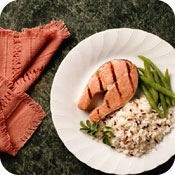 Your body's demand for iron will never be greater than it is right now during pregnancy. Additional iron is needed because of the 45 percent increase in your blood volume. Iron is needed to form the blood component called hemoglobin, which carries the oxygen in the blood to you and your baby. Iron also supports the immune system and aids in brain development.
Your body's demand for iron will never be greater than it is right now during pregnancy. Additional iron is needed because of the 45 percent increase in your blood volume. Iron is needed to form the blood component called hemoglobin, which carries the oxygen in the blood to you and your baby. Iron also supports the immune system and aids in brain development.
The baby is also storing enough iron to last 3-6 months after birth, and it is important for your baby to be born with rich iron stores as well. Therefore, the recommended iron needed during pregnancy is 27 milligrams. (During breastfeeding, moms should continue to get 27 milligrams a day, while 18 milligrams is sufficient for bottlefeeding moms.) Insufficient iron consumption during pregnancy can cause anemia, which can led to:
- Increased chance of hemorrhage
- Increased risk of infection
- Pre-term births and low birth weights
- Fatigue
- Loss of appetite and
- Weakness
- Increased risk of post-partum depression
To meet your iron needs include some of these iron-rich foods in your diet:
| Food sources |
Milligrams
|
| Clams, canned, drained, 3 ounces |
23.8 |
| Fortified ready-to-eat cereals (various), 1 ounces |
21.1-1.8 (varies) |
| Organ meats, 3 ounces, cooked |
9.9-5.2 |
| Lentils, boiled, 1 cup |
6.6 |
| Fortified instant cooked cereals (various), 1 packet |
8.1-4.9 |
| Pumpkin and squash seed kernels, roasted, 1 ounces |
4.2 |
| White beans, canned, 1/2 cup |
3.9 |
| Blackstrap molasses, 1 Tablespoon |
3.5 |
| Lentils, 1/2 cup, cooked |
3.3 |
| Spinach, 1/2 cup, cooked |
3.2 |
| Kidney beans, 1/2 cup, cooked |
2.6 |
| Chickpeas, 1/2 cup, cooked |
2.4 |
| Prune juice, 3/4 cup |
2.3 |
| Black-eyed peas, 1/2 cup, cooked |
2.2 |
| Ground beef (15% fat), 3 ounces, cooked |
2.2 |
| Tomato puree, 1/2 cup |
2.2 |
| Lima beans, 1/2 cup, cooked |
2.2 |
Pump Up Your Iron
To increase the absorption of iron, try these tips:
- Iron in meat is better absorbed than iron in plant food.
- Meat, poultry and fish help absorb the iron in plant foods.
- Vitamin C helps the body absorb iron. So eat Vitamin C foods with your iron-rich foods.
- Good sources of vitamin C include citrus fruits and juice, melon, strawberries, tomatoes, broccoli, baked potatoes, green peppers, cabbage and kiwi.
- Avoid tea and coffee when taking iron supplements or prenatal vitamins. Substances in these beverages can decrease iron absorption by up to 80%.
- Cook foods in cast iron pots. This will increase the iron content of foods.
- To assure adequate iron intake, most healthcare providers prescribe taking a prenatal supplement that contains iron. Your prenatal supplement contains 27-30 milligrams of iron.
This article was reviewed by Tanya Jolliffe, a BabyFit healthy eating expert.
|
 Your body's demand for iron will never be greater than it is right now during pregnancy. Additional iron is needed because of the 45 percent increase in your blood volume. Iron is needed to form the blood component called hemoglobin, which carries the oxygen in the blood to you and your baby. Iron also supports the immune system and aids in brain development.
Your body's demand for iron will never be greater than it is right now during pregnancy. Additional iron is needed because of the 45 percent increase in your blood volume. Iron is needed to form the blood component called hemoglobin, which carries the oxygen in the blood to you and your baby. Iron also supports the immune system and aids in brain development. 




Member Comments